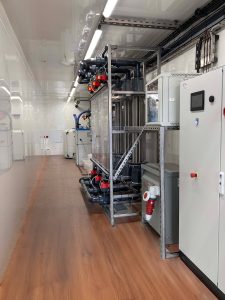Runcorn, UK – 27th April 2025
Water treatment solutions specialist Arvia Technology has announced the launch of Nyex Florenox™, a range of electrochemical oxidation reactors that can destroy per- and polyfluoroalkyl substances (PFAS) from concentrates.
PFAS are a group of over 14,000 synthetic chemicals that contain a chain of carbon and fluorine atoms, which is one of the strongest bonds in organic chemistry. Their reduction of friction, and resistance to stains, water, and heat, means they are commonly used in the manufacture of both industrial and consumer goods, including shampoo, food packaging, and non-stick cookware.
contain a chain of carbon and fluorine atoms, which is one of the strongest bonds in organic chemistry. Their reduction of friction, and resistance to stains, water, and heat, means they are commonly used in the manufacture of both industrial and consumer goods, including shampoo, food packaging, and non-stick cookware.
However, the carbon-fluorine bond also means that PFAS do not break down easily, leading them to be dubbed “forever chemicals”. Consequently, PFAS are now widely present in both the environment and even human bodies, with a 2024 study showing that absorption levels were as high as 60% .
Simon Gatcliffe, CEO of Arvia Technology, said: “Due to the fact that PFAS do not break down easily, if at all, current PFAS remediation techniques, such as resorting to landfill or incineration, essentially move the problem from one location to another without addressing the root cause. With the launch of Florenox™, we intend to break this cycle by targeting the carbon-fluorine bond directly and destroying it.”
At the heart of Florenox is Nyex.3™, a new electrode material developed by Arvia’s R&D team. As it is an inactive electrode, Nyex.3 anodes promote the formation of highly reactive hydroxyl radicals, capable of breaking strong carbon-fluoride bonds and destroying PFAS chemicals. Unlike comparative technologies, Nyex.3 is fluoride resistant, offering a significant increase in lifespan for each unit.
The 3D nature of the Nyex.3 electrodes is also unique to Florenox, offering a larger surface area for the mass transfer of PFAS, making the technology particularly effective at treating low concentration levels of forever chemicals. This includes concentrates from foam fractionation processes, leachates, and water containing aqueous film-forming foam (AFFF).
Florenox, offering a larger surface area for the mass transfer of PFAS, making the technology particularly effective at treating low concentration levels of forever chemicals. This includes concentrates from foam fractionation processes, leachates, and water containing aqueous film-forming foam (AFFF).
PFAS have recently been a primary target of environmental legislation in the UK, US, and Europe, though standards currently vary from nation to nation. For instance, the UK Drinking Water Inspectorate (DWI) currently specifies guidelines of 0.1 parts per billion , while the US Environmental Protection Agency (EPA) introduced guidelines of 4 parts per trillion for PFOA and PFOS in 2024.
Simon concluded: “Despite varying standards on PFAS from country to country, legislation is only heading in one direction, with the risk of litigation also on the rise. In the US alone, PFAS clean-up settlement fees already total $16.7 billion , while landmark cases are continuing to crop up across Europe too.
“With this in mind, we are strongly advising industry stakeholders to get ahead of the curve on PFAS management in order to mitigate the possibility of legal recourse in future. We encourage businesses to get in touch to discuss their treatment challenges, and arrange a treatability test today.”
— Ends —
About Arvia
Arvia Technology specialises in advanced water treatment solutions, focusing on the removal of specific organic contaminants and PFAS from industrial wastewater. Arvia are world leading experts in the removal of recalcitrant organics.
With almost two decades in the industry, they have proven experience and offer solutions that suit your specific needs. Arvia operates in the environmental technology sector, serving a diverse range of clients including the life sciences, chemical manufacturers, and textile industries.
Environmental sustainability is at the heart of Arvia’s vision, and they have a strong focus on fulfilling their social responsibilities. They provide a range of services to help you manage your effluent including treatability trials, pilot unit rental, remote monitoring and full-service packages to suit your requirements. Working with Arvia will enable you to get ahead of regulatory challenges, ensuring you are protected from environmental lawsuits. In addition, water reuse will help with the transition to a circular economy thereby enhancing future business resilience.